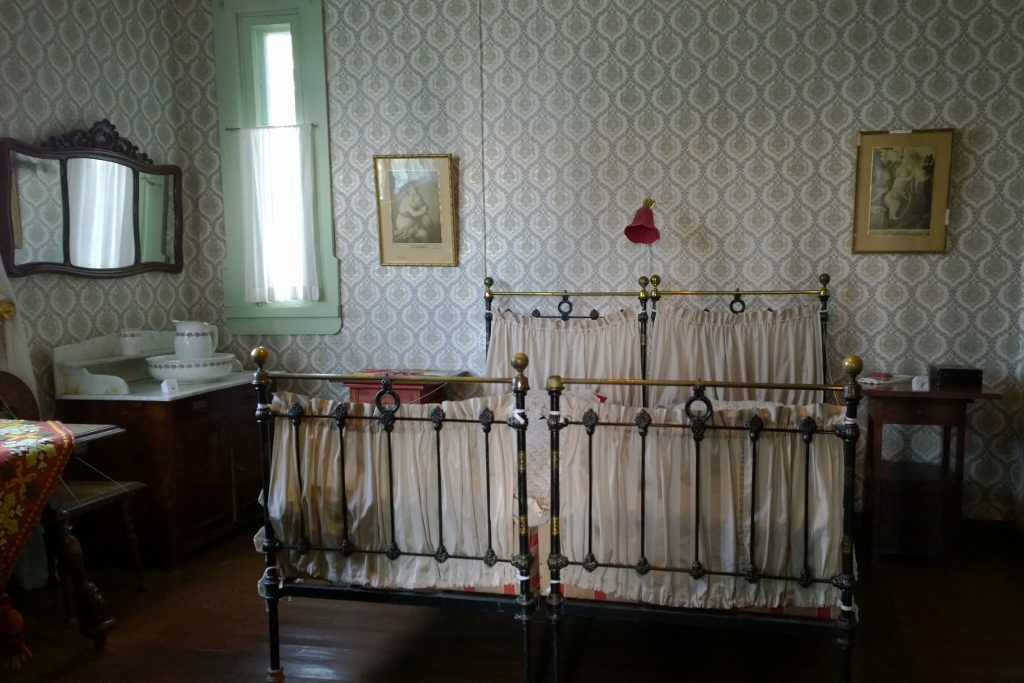Let’s
go back a century to Visavuori, a gorgeous
example of the lifestyle of the most successful artists of the Finnish national
romanticism era. The men were cosmopolites having lived abroad and studied at
the best art schools of Europe. However, when returning home they wanted to settle
down in the countryside and lead an uncomplicated life close to nature finding
their inspiration in national traditions.
I
already wrote about the studio of sculptor Emil
Wikström (here). This post
concentrates on his home, the other of the turn-of-the-century buildings at
Visavuori, now a museum in Sääksmäki.
The
first building on the site housing both Wikström’s home and studio was
completed in 1894. Only two years later it burned down in a fire when a kitchen
maid placed a basket on coals that she didn’t notice hadn’t been extinguished
yet. Wikström was not discouraged by the setback but started sketching a new studio
and a separate home. A few years earlier, he had won a major sculptural competition
for the pediment of the House of the Estates in Helsinki. It still is the most demanding
sculptural project in our country. The huge commission provided him the means
to create a new, even grander Visavuori.
While
the new home and studio were being built, Wikström returned to Central Europe living there for
almost five years, but now he also had a wife and a daughter. His wife Alice
was the daughter of a French-speaking tutor from Switzerland who had come to
Finland through marriage, which must have been one of the reasons why they
chose Paris as their temporary residence.
The
family moved back to Visavuori as soon as the new home was completed in 1902.
(The first phase of the new studio was completed a year later.) Today, the
house is a fabulous and rare example of Karelian style architecture. It is
built of logs treated with tar tinted with red ochre. There are two verandas,
one small balcony and even a lookout on the rooftop, all rich in decorative wood
carvings adorned with a colour scheme of red, green and yellow.
 |
| Portrait of Alice Wikström by Dora Wahlroos. |
The
interior, however, is very far from the national romantic exterior.
The style of the decor is strikingly Central European reflecting the background
and taste of Wikström’s wife. The walls are papered. There are crystal
chandeliers and oriental carpets. The period pieces of furniture were brought from
abroad, mainly from Paris.
 |
| Portrait of Emil Wikström by Wilho Sjöström. |
 |
| The kitchen maid's bedroom. |
The
kitchen was rather dimly lit so I didn’t take any photos there, which I regret.
I later read it was equipped with all the latest appliances of the time, such
as a special stove to warm the plates and an ice cream machine. Alice Wikström
was a sophisticated lady who carried refinement in her bones. In fact, it is said she
never felt completely at home at Visavuori.
 |
| The French style master bedroom. |
I am amazed a city lady like her, who spoke French to her children and
Swedish to her husband, a lady who had the maid change to a black uniform for
dinner and “…ran the tablecloth through
the mangle daily, unless it was replaced with a clean one”, I am amazed a lady like that actually
lived at a secluded place like Visavuori for years. Their marriage that produced three daughters must
have been a very happy one. Seeing her spouse completely contented leading his
ideal life in his ideal habitat must have made her kind of happy, too. I am sure
I would have been overjoyed to live at a place like this with views like this
– at least during the summer season...
After
the 1918 civil war, the family moved to Helsinki. From that time on, Visavuori
served as their summer and holiday residence. It remains Wikström’s best-known work
of art.
The four ‘lantern bearers’ also called ‘stone men’ at the main entrance to the
Helsinki Central Railway Station are his best-known sculptures. The beloved men
were refurbished last winter and the building itself is currently under
renovation.























Upea paikka tuo Visavuori!
ReplyDeleteOn siellä mahtanut olla idyllistä, vaikka rouvalla on tainnut välistä olla hankaluuksia saada kaikkia tarvitsemiaan tarveaineita sinne maalle metsän keskelle.
DeleteKiitos tästä postauksesta! Olen suunnitellut reissua Visavuoreen, joten olipas hauska nähdä tämä. Minä muistan joskus vuosia vuosia sitten hakeneeni kesätöihin tuonne..en suoraan sanoen edes muista, miten siinä sitten lopulta kävin. En ainakaan mennyt töihin, mutta jossain haastattelussa taisin olla.
ReplyDeleteVuosikymmenet olen ajellut kolmostietä Etelä-Pohjanmaalle, mutta aina on ollut kiire paikasta A paikkaan B. Nyt tuli vihdoin poikettua, ja olin haltioissani.
DeleteYour post was so interesting . Their home and location look so beautiful especially at this time of year. The ceiling is fantastic and the exterior reminds me of Swiss chalets. Sarah x
ReplyDeleteThe contrast between the exterior and interior is fabulous, isn't it?
Delete